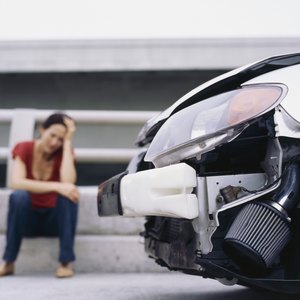
A car wreck can leave you with costly repairs, the need to replace a vehicle and medical bills for yourself and others. In many states you can look to the other driver's vehicle insurance if he or she is the blame. Most states require motorists to carry insurance that pays the physical damages or personal injuries caused by careless driving. As a result, you can readily find the name of the driver's insurance company -- if the driver obeys the insurance law.
First Things First
Do not leave the accident scene without getting all the information you can or without the permission of the police. Leaving the scene may be illegal in your state. Photograph the license plate and car if you can do so without getting hurt. If you don’t have a camera or if it's not safe to take pictures, write down the license plate number, make, model and color of the vehicle. Call 911 or the police or highway patrol. Your state likely will require you to call police if someone dies or is injured in the accident.
Ask At the Scene
Ask the other driver for the vehicle registration card, insurance card or a copy of the insurance policy. The driver should have at least the registration or insurance card in the car that struck you. When the police respond, the officer will generally gather insurance information from you and all the other drivers involved.
Pull the Accident Report
If you can’t get the insurance company’s name at the accident scene, get a copy of the accident report. Your state motor vehicle division will have it if the highway patrol or state police responded. Contact the police or sheriff’s office where the crash happened if police or sheriff responded. Drivers are required to file an accident report (if the police haven’t already) if someone was injured or died or if the damage exceeds a certain dollar amount or someone dies or is injured.
Other Driver Not Insured?
You don’t necessarily need to fret if the driver that hit you has no insurance. If you or your parents carry uninsured motorist insurance, your company pays you for vehicle damage or your injuries if the other driver is at fault. When you try to collect under your uninsured coverage, your insurance company is actually defending the driver that hit you. In states such as Oregon, uninsured coverage must come with your insurance policy. Other states allow you to choose if you want it, though in some states it is not available. Collision insurance reimburses you for the vehicle damage after you pay a certain amount -- called the deductible -- out of your own pocket. Unlike uninsured motorist insurance, you can get collision coverage even if you can’t blame the other driver.
References
- Oregon.gov: Oregon Division of Motor Vehicles: Insurance Requirements
- Pennsylvania Division of Motor Vehicles: Driver's Manual: Chapter 4 -- Driving Record Information
- Washington State Office of the Insurance Commissioner: Your Auto Insurance Rights and Responsibilities
- Tennessee Department of Homeland Security: Frequently Asked Questions -- Where Can I Obtain a Copy of a Crash Report
- New York State Department of Motor Vehicles: Report of Motor Vehicle Accident
- The State Bar of California: What Should I Do If I Have an Auto Accident
- New Hampshire Department of Safety: Division of Motor Vehicles: Driver's Manual
- FindLaw. "Leaving the Scene of an Accident/Hit and Run." Accessed May 2, 2020.
- Nolo. "Consequences of a Hit and Run Accident." Accessed May 2, 2020.
- AAA Foundation for Traffic Safety. "Hit-and-Run Crashes: Prevalence, Contributing Factors and Countermeasures." Accessed May 2, 2020.
- The Automobile Association. "What If You're Involved in a Hit and Run?" Accessed May 2, 2020.
- Insurance Information Institute. "What to Do at the Scene of an Accident." Accessed May 2, 2020.
- Allstate. "What to Do After a Car Accident: A Step-by-Step Guide." Accessed May 2, 2020.
- HG.org. "I Was Involved in a Hit and Run Accident." Accessed May 2, 2020.
- Allstate. "My Car Was Damaged in a Hit-and-Run. Am I Covered?" Accessed May 2, 2020.
- Insurance Information Institute. "Protect Yourself Against Uninsured Motorists." Accessed May 2, 2020.
Resources
- ConsumerReports.org: When to Report a Car Accident to an Insurance Company
- Commonwealth of Virginia: State Corporation Commission: Bureau of Insurance: Teenager’s Guide to Auto Insurance
- National Association of Insurance Commissioners: Consumer Alert: Auto Insurance -- Get Prepared Before Your Summer Road Trip
Writer Bio
Christopher Raines enjoys sharing his knowledge of business, financial matters and the law. He earned his business administration and law degrees from the University of North Carolina at Chapel Hill. As a lawyer since August 1996, Raines has handled cases involving business, consumer and other areas of the law.

